|
Sunday:
February 10, 2002 | |
0130 GMT |
 |
Delta 2 to launch Sunday
Boeing officials have decided to make an attempt to launch the Delta 2 rocket on Sunday despite a less-than-optimistic weather forecast that calls for an 80 percent chance high winds will scrub the liftoff. Friday's attempt was scrubbed by winds and problems with a downrange tracking aircraft thwarted Saturday's attempt. The rocket is carrying five satellites that will serve as orbiting replacements for the Iridium mobile communications constellation.
 MISSION STATUS CENTER - live updates MISSION STATUS CENTER - live updates
 LAUNCH EVENTS TIMELINE LAUNCH EVENTS TIMELINE
 GROUND TRACK MAP GROUND TRACK MAP
 DAILY LAUNCH WINDOWS CHART DAILY LAUNCH WINDOWS CHART
 |  |

|
 |
Where lightning strikes
Lightning. It avoids the ocean, but likes Florida. It's likely to strike in the Himalayas and even more so in central Africa. And lightning almost never strikes the North or South Poles. These are just a few of the things NASA scientists have learned using satellites to monitor worldwide lightning.
 FULL STORY FULL STORY
 |  |

|
 |
|
Saturday:
February 9, 2002 | |
0249 GMT |
 |
Boeing Delta 2 launch rescheduled for Saturday
The launch of a Boeing Delta 2 rocket was called off in the final minute of the countdown Friday at Vandenberg Air Force Base in California due to a wind gust at the pad. Liftoff was rescheduled for 1754:55 GMT (12:54:55 p.m. EST) Saturday to deliver into space five satellites that will serve as orbiting replacements for the Iridium mobile communications constellation.
 MISSION STATUS CENTER - live updates MISSION STATUS CENTER - live updates
 LAUNCH EVENTS TIMELINE LAUNCH EVENTS TIMELINE
 GROUND TRACK MAP GROUND TRACK MAP
 DAILY LAUNCH WINDOWS CHART DAILY LAUNCH WINDOWS CHART
 |  |

|
 |
Thrusters precisely guide EO-1 satellite in space first
Pulsed plasma thrusters has been used to precisely guide and point a satellite in space, paving the way for use of this technology on future spacecraft to save weight, fuel and cut power consumption.
 FULL STORY FULL STORY
 |  |
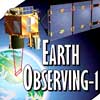
|
 |
|
Friday:
February 8, 2002 | |
0450 GMT |
 |
Delta 2 rocket to launch Iridium satellites today
A Boeing Delta 2 rocket is set for launch today from Vandenberg Air Force Base in California to deliver into space five satellites that will serve as orbiting replacements for the Iridium mobile communications constellation.
 MISSION STATUS CENTER - updates MISSION STATUS CENTER - updates
 LAUNCH EVENTS TIMELINE LAUNCH EVENTS TIMELINE
 GROUND TRACK MAP GROUND TRACK MAP
 DAILY LAUNCH WINDOWS CHART DAILY LAUNCH WINDOWS CHART
 |  |

|
 |
Tides of Jovian moon Europa might support life
Jupiter's moon Europa might not only sustain but foster life according to the research of a University of Arizona professor. Richard Greenberg, also a member of the Imaging Team for NASA's Galileo Jupiter-orbiter spacecraft, reports that a combination of several factors could create habitable niches.
 FULL STORY FULL STORY
 |  |
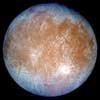
|
 |
Hubble telescope reveals 'backwards' spiral galaxy
Astronomers have found a spiral galaxy that may be spinning to the beat
of a different cosmic drummer. To the surprise of astronomers, the galaxy appears to be rotating in the opposite direction to what they expected.
 FULL STORY FULL STORY
 |  |

|
 |
Chandra scores a double bonus with a distant quasar
Two discoveries from a distant quasar -- an enormous X-ray jet and an X-ray shadow cast by an intervening galaxy -- are giving astronomers using NASA's Chandra X-ray Observatory cause to be doubly excited. These results reveal information about a supermassive black hole at the center of the quasar as well as the amount of oxygen in a distant galaxy billions of years ago.
 FULL STORY FULL STORY
 |  |

|
 |
|
Thursday:
February 7, 2002 | |
0427 GMT |
 |
Delta 2 rocket to launch backup Iridium satellites
A Boeing Delta 2 rocket is set for launch Friday from Vandenberg Air Force Base in California to deliver into space five satellites that will serve as orbiting replacements for the Iridium mobile communications constellation.
 MISSION STATUS CENTER MISSION STATUS CENTER
 LAUNCH EVENTS TIMELINE LAUNCH EVENTS TIMELINE
 GROUND TRACK MAP GROUND TRACK MAP
 DAILY LAUNCH WINDOWS CHART DAILY LAUNCH WINDOWS CHART
 |  |

|
 |
Buzz Aldrin, Purdue engineers plan Mars hotels
Buzz Aldrin, the second man to walk on the moon, is leading a team of researchers, including engineers at Purdue University, to design a new class of spacecraft that would serve as orbiting hotels perpetually cruising between Earth and Mars.
 FULL STORY FULL STORY
 |  |
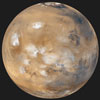
|
 |
NASA scientists find new evidence of climate change
After examining 22 years of satellite measurements, NASA researchers find that more sunlight entered the tropics and more heat escaped to space in the 1990s than in the 1980s. Their findings indicate less cloud cover blocked incoming radiation and trapped outgoing heat.
 FULL STORY FULL STORY
 |  |

|
 |
|
Wednesday:
February 6, 2002 | |
0445 GMT |
 |
Solar explorer successfully launched by Pegasus rocket
After a 19-month delay, NASA's HESSI spacecraft was finally lofted into orbit Tuesday aboard an air-launched Pegasus rocket, but not without a hiccup in the countdown that forced officials to abort one attempt before succeeding a second time around.
 FULL STORY FULL STORY
 MISSION STATUS CENTER MISSION STATUS CENTER
 LAUNCH EVENTS TIMELINE LAUNCH EVENTS TIMELINE
 HESSI SATELLITE FACT SHEET HESSI SATELLITE FACT SHEET
 PEGASUS ROCKET OVERVIEW PEGASUS ROCKET OVERVIEW
 |  |

|
 |
Kennedy Space Center to perform shuttle mods
After completing detailed, independent cost and risk assessments, NASA has decided to perform future major modification work on its space shuttles at Kennedy Space Center instead of Palmdale, California.
 FULL STORY FULL STORY
 |  |

|
 |
Congressmen show support for O'Keefe, NASA budget
One day after NASA's proposed 2003 budget was released by the Bush Administration, two key members of Congress said they supported the budget proposal in general and gave new administrator Sean O'Keefe a vote of confidence.
 FULL STORY FULL STORY
 |  |

|
 |
|
Tuesday:
February 5, 2002 | |
0448 GMT |
 |
Winged rocket to launch from carrier jet today
An air-launch Pegasus rocket will be dropped from the belly of an L-1011 jetliner off the coast of Central Florida at 3:26 p.m. EST (2026 GMT) today to carry NASA's HESSI satellite into space.
 MISSION STATUS CENTER - updates MISSION STATUS CENTER - updates
 LAUNCH EVENTS TIMELINE LAUNCH EVENTS TIMELINE
 HESSI SATELLITE FACT SHEET HESSI SATELLITE FACT SHEET
 PEGASUS ROCKET OVERVIEW PEGASUS ROCKET OVERVIEW
 |  |

|
 |
NASA emphasizes basics in 2003 budget proposal
A fiscal year 2003 budget proposal released Monday by the Bush Administration would give the space agency roughly the same amount of money as in 2002 but would redirect those funds towards more basic research and development efforts.
 FULL STORY FULL STORY
 |  |
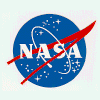
|
 |
NASA prepares to launch space tether experiment
Propellant-free propulsion technology has taken a critical step toward reality, completing a series of systems tests at NASA's Marshall Space Flight Center. The tether-based propulsion experiment draws power from the space environment around Earth, allowing the transfer of energy from the Earth to the spacecraft.
 FULL STORY FULL STORY
 |  |

|
 |
Reentry satellite lost during launch of H-2A rocket
Japanese space officials acknowledged Monday that contact had been lost with a reentry demonstration satellite launched by the H-2A rocket and there was no evidence that the craft even separated from its ride to space.
 MISSION STATUS CENTER - updates MISSION STATUS CENTER - updates
 LAUNCH EVENTS TIMELINE LAUNCH EVENTS TIMELINE
 MAP OF LAUNCH GROUND TRACK MAP OF LAUNCH GROUND TRACK
 H-2A ROCKET DIAGRAM H-2A ROCKET DIAGRAM
 |  |
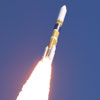
|
 |
|
Monday:
February 4, 2002 | |
0524 GMT |
 |
Japan launches H-2A rocket on demonstration flight
Japan's H-2A rocket flew three demonstration payloads into orbit today, marking the second and final test flight for the new launcher that is planned to go into full service in August.
 MISSION STATUS CENTER - updates MISSION STATUS CENTER - updates
 LAUNCH EVENTS TIMELINE LAUNCH EVENTS TIMELINE
 MAP OF LAUNCH GROUND TRACK MAP OF LAUNCH GROUND TRACK
 H-2A ROCKET DIAGRAM H-2A ROCKET DIAGRAM
 |  |

|
 |
The saga of HESSI
Its launch has been delayed 19 months by six different concerns, but finally all appears ready for NASA's HESSI satellite to soar into space Tuesday to study the most powerful explosions in the solar system.
 FULL STORY FULL STORY
 LAUNCH EVENTS TIMELINE LAUNCH EVENTS TIMELINE
 HESSI SATELLITE FACT SHEET HESSI SATELLITE FACT SHEET
 PEGASUS ROCKET OVERVIEW PEGASUS ROCKET OVERVIEW
 |  |

|
 |


 Astronomy Now and Spaceflight Now present a 100-page, full-color special publication: 2001: a Year in Space. A stunning month-by-month pictorial record of the space events and discoveries during 2001. Available now from our store.
Astronomy Now and Spaceflight Now present a 100-page, full-color special publication: 2001: a Year in Space. A stunning month-by-month pictorial record of the space events and discoveries during 2001. Available now from our store. The Hubble Space Telescope's majestic view of the Eskimo Nebula. This spectacular poster is available now from the Astronomy Now Store.
The Hubble Space Telescope's majestic view of the Eskimo Nebula. This spectacular poster is available now from the Astronomy Now Store.